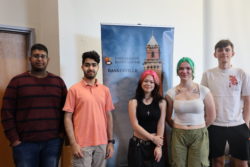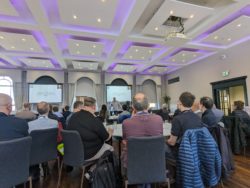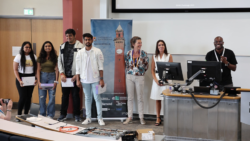We would like to advise BEAR users of upcoming essential maintenance on cooling systems that will impact our services over Easter, in particular the HPC-facility, BlueBEAR, which will be unavailable for two weeks. Background behind the maintenance The Park Grange Data Centre is where the University’s High-Performance Computing systems, BlueBEAR and Baskerville reside, as well … Continue reading “Cooling works in data centre – upcoming service disruption”
Tag: Baskerville
May 2025 BEAR Newsletter
Birmingham Environment for Academic Research (BEAR) Newsletter As we head into summer, we have a busy events season starting this week with the HPC-SIG in Cambridge, the Thesis Submission event for PGRs, and the BEAR Conference. Hopefully you will have seen that our summer programme of BEAR training workshops (being held online) has now been released, and you can … Continue reading “May 2025 BEAR Newsletter”
Reflections on the BEAR Challenge 2024
In this blog post, we hear from Ivan Korniichuk, a member of the third-placed team in BEAR Challenge 2024, who gives his perspective on the recent event. I am delighted to announce that our team “return -1” achieved 3rd place in the BEAR Challenge 2024! Participating in this intensive three-day event at the University of … Continue reading “Reflections on the BEAR Challenge 2024”
June BEAR Newsletter
This month we cover lots of past and future events, with blog posts on the BEAR Conference and Baskerville Showcase, together with details on a session at the Postgraduate Research Festival and the BioFAIR Roadshow. We also have some articles on life within the Advanced Research Computing team, to give you an insight into our … Continue reading “June BEAR Newsletter”
Just about “and managing” in the RSE world, within ARC
The field of research software engineering has grown steadily since the term “Research Software Engineer” (RSE) was coined in 2012. Many research-intensive universities now have central teams of RSEs who, like the Research Software Group (RSG) in Advanced Research Computing (ARC) here in Birmingham, are available to support researchers across the university with their bespoke … Continue reading “Just about “and managing” in the RSE world, within ARC”
BEAR Challenge 2023
“The event was fun, challenging, and insightful. The best part was that it gave me an opportunity to work and learn something new with my friends. Thank you, team!” This is a quote from one of the participants who attended the BEAR Challenge held between 19th-21st June. The aim of the challenge is to introduce … Continue reading “BEAR Challenge 2023”
Essential HPC tools – tmux
In this blog post on Advanced Research Computing tips, one of our Research Software Engineers, Dr James Allsopp, gives some tips on logging into Linux-based systems such as BlueBEAR and Baskerville, using tmux. Whenever I have to remote into a Linux-based system, one of the first things I look for is a program called tmux. … Continue reading “Essential HPC tools – tmux”
Baskerville pushes the boundaries
In this case study, we hear from Christos Baziotis, from Edinburgh, who has been making use of Baskerville to enable his research in text generation using machine learning models. I am a (3rd) final year Ph.D. candidate at the ILCC at the University of Edinburgh and a member of EdinburghNLP under the supervision of Barry Haddow and Alexandra Birch, in collaboration with Biao Zhang. In … Continue reading “Baskerville pushes the boundaries”
Predicting weather impacts using GPU-accelerated high-performance computing
You may not be aware, but all researchers at the University of Birmingham can request access to our Tier-2 (national) supercomputer, Baskerville. Dr Xilin Xia from the School of Civil Engineering describes below how Baskerville is essential for his research into predicting flooding… What is your research about? Due to Climate Change, we are seeing … Continue reading “Predicting weather impacts using GPU-accelerated high-performance computing”
Baskerville Basics
Baskerville is a GPU-focussed Tier 2 HPC cluster that attracts users from a wide range of disciplines and with varying levels of HPC experience. Since joining the ARC team one of my roles has been helping design a short training course called Baskerville Basics which provides useful information regardless of users’ research disciplines and HPC … Continue reading “Baskerville Basics”






